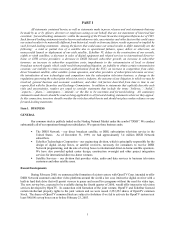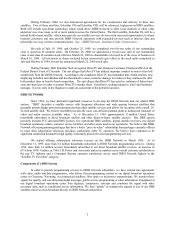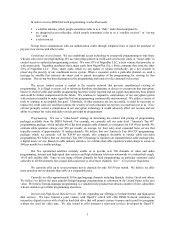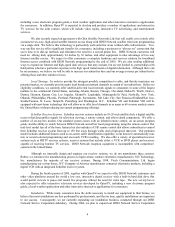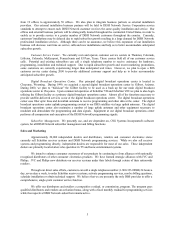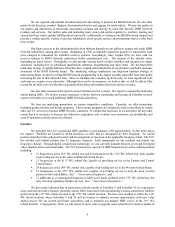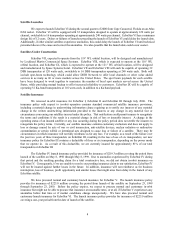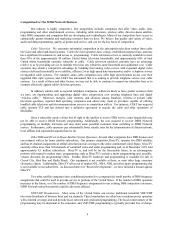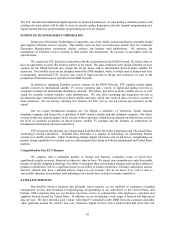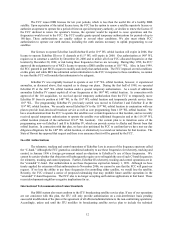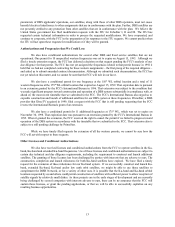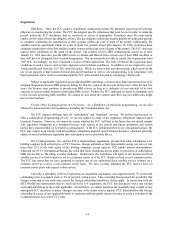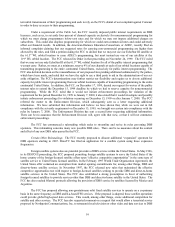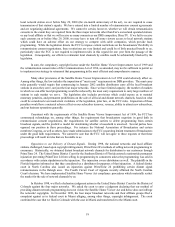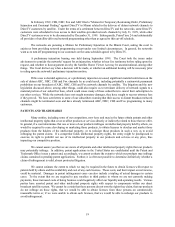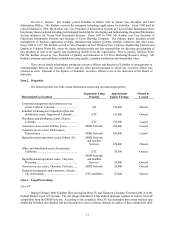Dish Network 1999 Annual Report Download - page 13
Download and view the complete annual report
Please find page 13 of the 1999 Dish Network annual report below. You can navigate through the pages in the report by either clicking on the pages listed below, or by using the keyword search tool below to find specific information within the annual report.11
permit viewers to pause and record live programs without the need for video tape. The new set-top box, expected to
be available during the fourth quarter of 2000, would offer interactive television services developed by OpenTV. In
addition, by the end of 2000, together with Gilat-To-Home we plan to offer consumers two-way, high-speed satellite
Internet access along with DISH Network satellite television programming via a single dish.
Competition For Our Satellite Services Business
We compete with a number of other companies, including those using similar and different technologies, to
provide satellite services. Many of these competitors have substantially greater financial and other resources than we
have. Our principal competitors include, other satellite system operators, cable television system operators, Internet
service providers, and telephone companies. While there can be no assurance, we believe that we can compete with
these other companies based on our knowledge and experience in the direct-to-home satellite TV and DBS industry,
our technological leadership and new product capabilities, the quality of our video, audio and data transmissions, the
quality of service provided, and cost.
GOVERNMENT REGULATION
The following summary of regulatory developments and legislation is not intended to describe all present
and proposed government regulation and legislation affecting the video programming distribution industry.
Government regulations that are currently the subject of judicial or administrative proceedings, legislative hearings
or administrative proposals could change our industry, in varying degrees. We can not predict either the outcome of
these proceedings or any potential impact they might have on the industry or on our operations. This section sets
forth a brief summary of regulatory issues pertaining to our operations.
We are required to obtain authorizations and permits from the FCC and other similar foreign regulatory
agencies to construct, launch and operate our satellites and other components of our DBS system. Additionally, as a
private operator of a United States satellite system, we are subject to the regulatory authority of the FCC and the
Radio Regulations promulgated by the International Telecommunication Union. We also have to obtain import and
general destination export licenses from the United States Department of Commerce to receive and deliver
components of direct-to-home satellite TV systems. In addition, the delivery of satellites and related technical
information for the purpose of launch by foreign launch services provider is subject to strict export control and prior
approval requirements.
FCC Permits and Licenses
The FCC has jurisdiction and review power over the following general areas:
• assigning frequencies and authorizations;
• ensuring compliance with the terms and conditions of such assignments and authorizations, including
required timetables for construction and operation of satellites and other due diligence requirements;
• authorizing individual satellites and earth stations;
• avoiding interference with other radio frequency emitters;
• ensuring compliance with applicable provisions of the Communications Act of 1934.
All of our FCC authorizations are subject to conditions as well as to the FCC’s authority to modify, cancel
or revoke them. In addition, all of our authorizations for satellite systems that are not yet operational are subject to
construction and progress obligations, milestones, reporting and other requirements. The FCC has indicated that it
may revoke, terminate, condition or decline to extend or renew such authorizations if we fail to comply with
applicable Communications Act requirements. If we fail to file adequate reports or to demonstrate progress in the
construction of our satellite systems, the FCC has stated that it may cancel our authorizations for those systems. We
have not filed, or timely filed, all required reports or other filings, and some of our construction permits have expired,
in connection with our authorized systems with the FCC. We cannot be certain whether or not the FCC would cancel
our authorizations. While we have filed with the FCC pending requests for extensions of authorizations that have
expired, we cannot be sure how the FCC will rule on these requests. In addition, some of our permits and extension
requests have been, and may continue to be, contested in FCC proceedings and in court by several companies with
adverse interests.


